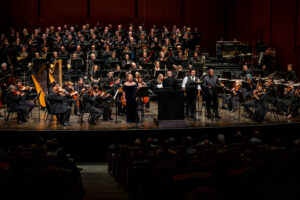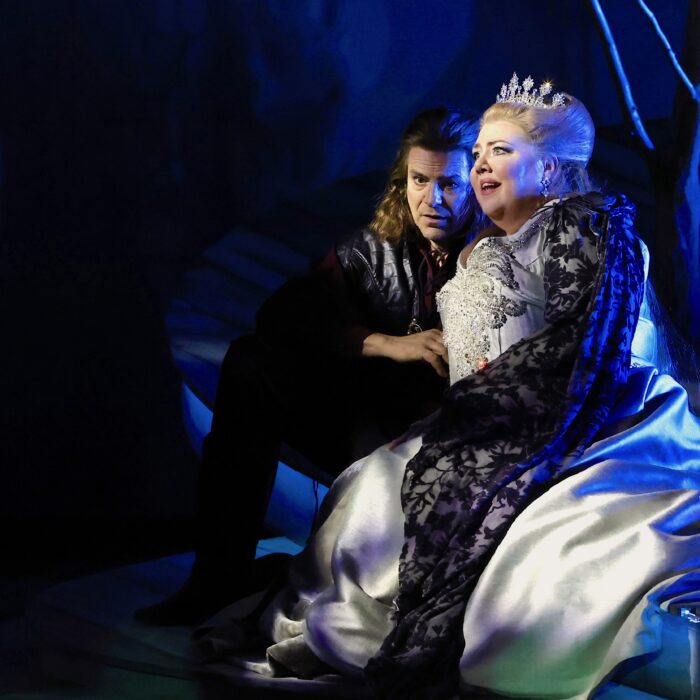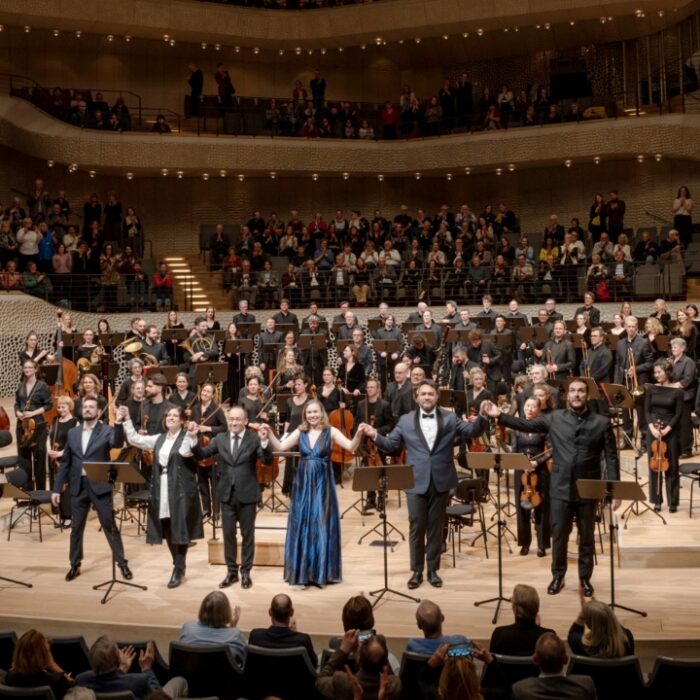
Bard Music Festival 2024 Review: La damnation de Faust
Berlioz’s Masterpiece of Romanticism Soars in a Powerful Performance
By Matt Costello(Photo by Matt Dine)
There was a time that I would have unashamedly described myself an avid Berliozian. Which means, to me, that I not only loved Berlioz’s music but also the classic ‘romantic’ ideal his life represented.
Besides his epitomizing the dramatic life of the Romantic period artist, Berlioz clearly blazed a path with innovative forms of music that defied traditional labels, and always fed off the core stories and emotions of the turbulent period. He was also someone whose own life reflected those struggles, both in the successes and the great disappointments, with matching personal challenges.
For more on this subject, there are many excellent books such as the two-volume biography from David Cairns, and the other classic set from Jacques Barzun. Both essential and amongst my most treasured books on music, each one is a gripping and compelling read.
And though my extreme admiration of the composer has been replaced by, perhaps, a sense of balance, I was more than thrilled to see that this summer’s Bard Music Festival would be devoted to Hector Berlioz.
Musical Highlights
This always ground-breaking and in-depth festival closed out its intense deep dive into his own works, his peers, and those he influenced with what is arguably his greatest masterwork, “La damnation de Faust”.
Although this great work is not quite an opera and certainly not a traditional symphony, Berlioz himself dubbed it a “Dramatic Legend in Four Parts”. And it had a mixed launch. The Paris premiere was well received, but the subsequent performance in the capital was not well attended, though the work had great success with Berlioz conducting it in other European cities.
Still, this was somewhat of a disappointment and a theme that runs through much of Berlioz’s creative life.
This remarkable work, completed in 1846, and yet feeling like it is from a time so many decades later, has innovative influences rippling forward well into the early 20th Century.
But it is also a challenging work, with the chorus fully engaged for this hybrid work straddling symphony, opera and cantata. It is, on occasion, staged. For example, Sarah Caldwell’s Boston Opera was a memorable moment many decades ago. But with its scope, vision and symphonic sections that are also its cornerstone, it is always a tricky challenge.
And speaking of challenges, the Berlioz sound is distinct and deep in rich orchestral colors and moods. Therefore, it requires impeccable playing and a leader to match. Both would be present at the Bard Music Festival. Leon Botstein, President of Bard and Music Director of the festival orchestra, the American Symphony Orchestra, is a master at pieces that require concentration, power, and style.
Under his conducting, the orchestra navigated both the amusing and light aspects of Berlioz’s score with beauty and force, but equally rose to meet the dramatic demands with playing that was so electrifying in the acoustically wonderful Fisher Center, with its sprawling Frank Gehry exterior promising a matching swirl of emotions and experiences waiting inside.
The rousing “Hungarian March” was delivered with a crisp elan, with the brass displaying a lush sound. The timpani have much to do in the score, and Botstein guided them to nuanced display of power and portents. And the gentle, so very Berliozian sections, such as Faust’s aria that immediately follows, glowed with a Autumnal lightness.
The Bard Festival Chorale, directed by James Bagwell, was supple and wonderfully precise, responding beautifully to the many shifting tones and moods needed.
Illuminating Cast
The cast for such a masterpiece, is of course key. As the one-to-be damned, tenor Joshua Blue was a most touching and affective Faust.
While we may not be able to completely understand how he, as an aging philosopher, made such a risky pact with Satan, Blue’s strong and lyrical tenor conveyed the very Romantic passion, borderline obsession, towards his new love Marguerite.
He was well matched with a slyly conniving and wily Mephistopheles of bass-baritone Alfred Walker. While Walker has his moments of teasing levity, albeit always with a hint of threat, he brought the full power of his role and the force of Berlioz’s majestic score into play at the bracing, propulsive finale during the ride into the abyss.
He urges Faust to race faster, while his entrapped soul remains unaware of what is about to occur as he plunges down to doom in hell below.
Marguerite, sung by Sasha Cooke, employed her radiant mezzo-soprano to shape the (largely) innocent Marguerite into a character we wish to protect. Though one must admit there was indeed some poor judgment on the character’s part when it came to dosing her mother with, what turns out to be, a lethal potion for her Faustian trysts.
Cooke’s voice bloomed wonderfully throughout, matching the delicate beauties of the score. Her voice was beautiful and soaring, again reinforcing the passion displayed by Joshua Blue’s Faust. She was perfect and affective in the “Chanson de Roi de Thulé” aria. Her duet with Faust in Part three also recalled the wonders of Berlioz’s lesser well-known “Beatrice Et Benedict”, absolutely perfect and magical.
Bass Stefan Egerstrom as Brander made the most of his tavern song about a rat, creating a funny and musically beautiful moment, with the audience clearly wishing for more from the character and the performer.
And lastly, is the celestial voice that closes the piece as Marguerite is forgiven and welcomed into heaven (versus the other place). Emily Donato brought a sweet sense of calm and peace after a thrilling and tumultuous ride which, despite any staging, one could almost “see”.
This production was a fitting and memorable end to the 34th Season of the Bard Musical Festival, with its focus on one of the true titans of the Romantic era–the very epitome of such a remarkable era, with both its beauty and its drama.


